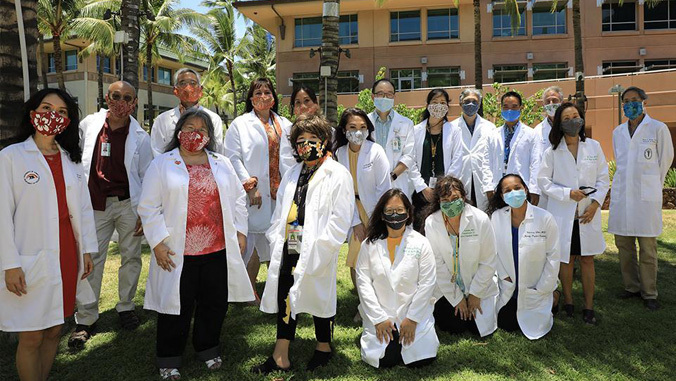
Hawaiʻi’s physician shortage is a serious problem that contributes to healthcare disparities, especially in neighbor island communities. The increased demand on physicians often leads to burnout and withdrawal from clinical practice, making the problem worse.
While the University of Hawaiʻi at Mānoa John A. Burns School of Medicine (JABSOM) has increased class sizes to train future doctors, students are also faced with the demands of their education, which can lead to burnout, depression and erosion of empathy without adding critical support.
An emerging trend in medical education, “learning communities” was launched by JABSOM this July with the MD Class of 2024 to boost engagement and enhance learning among medical students and faculty advisors. Each group comprises 24 to 28 students in different stages of their medical education, blending first-year students with second-, third- and fourth-year students.
“The solution to the shortage is not simply training more physicians,” said Jerris Hedges, JABSOM Dean and Barry and Virginia Weinman Endowed Chair. “We must train them differently, helping them to adopt a new skill set better suited for the future of medical practice in Hawaiʻi.”
Unlike cohorts of same-year classmates, these longitudinal relationships of new students, experienced students and faculty mentors allow Hawaiʻi’s future physicians to form connections with students graduating ahead of them, and following behind them as well.
Faculty advisors are role models in communication, empathy and patient interactions, staying with their learning communities from year to year, so students learn with them throughout their four years of medical training. The experience develops clinical skills, nurtures professional identity, provides career advice and encourages wellness—skills beyond the science of medicine for the benefit of the community.
A safe place to learn
Learning communities are a safe environment in which medical students may practice and make mistakes. In this setting, students learn relationship-based skills, such as self-awareness, self-management, social awareness, conflict resolution, organizational influence and team leadership.
“If medical students simply adopt technological practices without building physician-patient and physician-community connectivity, we will only see more distancing and dissatisfaction,” said Hedges. “This major change in teaching, in conjunction with the expansion of our curriculum, anticipates these practice changes, sustaining the human connectivity we all need.”
Hawaii Medical Service Association, UHA Health Insurance, Hawaiʻi Pacific Health and Mike Gold, a member of the JABSOM Dean’s Advisory Council, are among the learning communities program’s generous supporters.
- Related UH News story: $100K gift foster physician-patient relationships, August 18, 2020
Hedges said, “Our donors’ commitment provides resources to significantly evolve the manner in which we deliver medical education, with a growing focus on building healthy, resilient, professionally prepared students, residents and fellows.”
Read more on the UH Foundation website.

